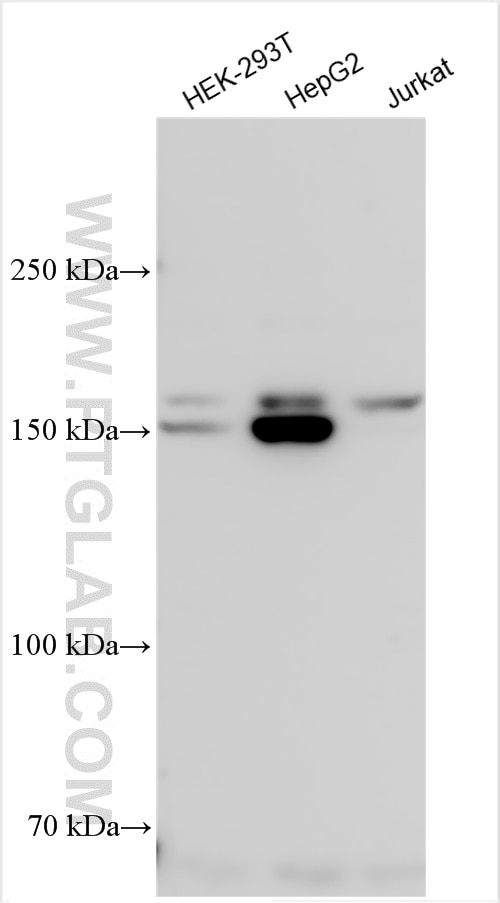DNMT1 Polyclonal antibody
DNMT1 Polyclonal Antibody for WB, ELISA
Host / Isotype
Rabbit / IgG
Reactivity
human
Applications
WB, ELISA
Conjugate
Unconjugated
Cat no : 28754-1-AP
Synonyms
Validation Data Gallery
Tested Applications
| Positive WB detected in | HEK-293T cells, HepG2 cells, Jurkat cells |
Recommended dilution
| Application | Dilution |
|---|---|
| Western Blot (WB) | WB : 1:1000-1:4000 |
| It is recommended that this reagent should be titrated in each testing system to obtain optimal results. | |
| Sample-dependent, Check data in validation data gallery. | |
Product Information
28754-1-AP targets DNMT1 in WB, ELISA applications and shows reactivity with human samples.
| Tested Reactivity | human |
| Host / Isotype | Rabbit / IgG |
| Class | Polyclonal |
| Type | Antibody |
| Immunogen | DNMT1 fusion protein Ag29479 相同性解析による交差性が予測される生物種 |
| Full Name | DNA (cytosine-5-)-methyltransferase 1 |
| Calculated molecular weight | 1632 aa, 185 kDa |
| Observed molecular weight | 145 kDa and 184 kDa |
| GenBank accession number | BC126227 |
| Gene symbol | DNMT1 |
| Gene ID (NCBI) | 1786 |
| Conjugate | Unconjugated |
| Form | Liquid |
| Purification Method | Antigen affinity purification |
| Storage Buffer | PBS with 0.02% sodium azide and 50% glycerol pH 7.3. |
| Storage Conditions | Store at -20°C. Stable for one year after shipment. Aliquoting is unnecessary for -20oC storage. |
Background Information
DNA methylation is a major epigenetic modification that regulates gene expression. DNMT1, the maintenance DNA methylation enzyme, is the primary enzyme responsible for copying methylation patterns after DNA replication. DNMT1 is required for X chromosome inactivation, imprinting, genomic methylation and proper embryonic development. Overexpression of DNMT1 has been reported in various cancers. DNMT1 exists some isoforms with the molecular mass of 184 kDa and 145 kDa. (PMID: 10753866)
Protocols
| Product Specific Protocols | |
|---|---|
| WB protocol for DNMT1 antibody 28754-1-AP | Download protocol |
| Standard Protocols | |
|---|---|
| Click here to view our Standard Protocols |


